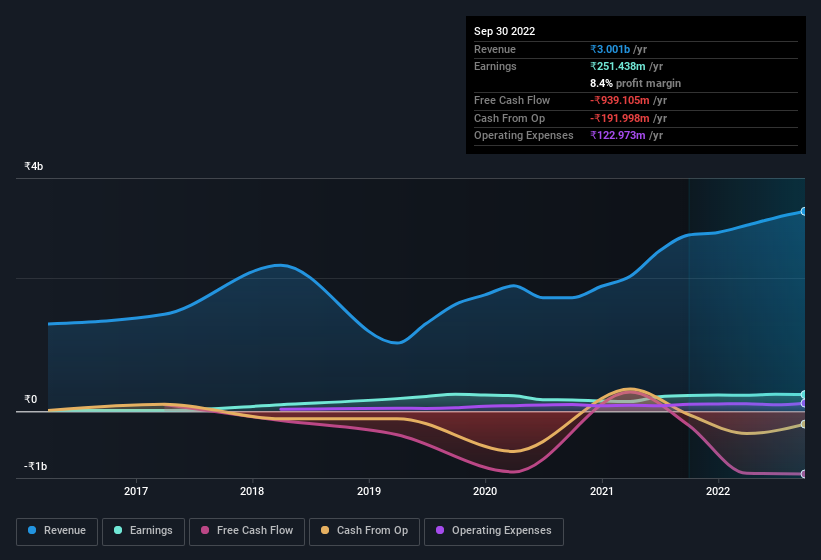Manorama Industries' (NSE:MANORAMA) Solid Earnings May Rest On Weak Foundations

The recent earnings posted by Manorama Industries Limited (NSE:MANORAMA) were solid, but the stock didn't move as much as we expected. However the statutory profit number doesn't tell the whole story, and we have found some factors which might be of concern to shareholders.
Check out the opportunities and risks within the IN Food industry.

Zooming In On Manorama Industries' Earnings
Many investors haven't heard of the accrual ratio from cashflow, but it is actually a useful measure of how well a company's profit is backed up by free cash flow (FCF) during a given period. In plain english, this ratio subtracts FCF from net profit, and divides that number by the company's average operating assets over that period. The ratio shows us how much a company's profit exceeds its FCF.
As a result, a negative accrual ratio is a positive for the company, and a positive accrual ratio is a negative. While it's not a problem to have a positive accrual ratio, indicating a certain level of non-cash profits, a high accrual ratio is arguably a bad thing, because it indicates paper profits are not matched by cash flow. Notably, there is some academic evidence that suggests that a high accrual ratio is a bad sign for near-term profits, generally speaking.
For the year to September 2022, Manorama Industries had an accrual ratio of 0.38. As a general rule, that bodes poorly for future profitability. And indeed, during the period the company didn't produce any free cash flow whatsoever. In the last twelve months it actually had negative free cash flow, with an outflow of ₹939m despite its profit of ₹251.4m, mentioned above. We also note that Manorama Industries' free cash flow was actually negative last year as well, so we could understand if shareholders were bothered by its outflow of ₹939m.
Note: we always recommend investors check balance sheet strength. Click here to be taken to our balance sheet analysis of Manorama Industries.
Our Take On Manorama Industries' Profit Performance
As we discussed above, we think Manorama Industries' earnings were not supported by free cash flow, which might concern some investors. For this reason, we think that Manorama Industries' statutory profits may be a bad guide to its underlying earnings power, and might give investors an overly positive impression of the company. The good news is that its earnings per share increased slightly in the last year. At the end of the day, it's essential to consider more than just the factors above, if you want to understand the company properly. So if you'd like to dive deeper into this stock, it's crucial to consider any risks it's facing. You'd be interested to know, that we found 1 warning sign for Manorama Industries and you'll want to know about it.
Today we've zoomed in on a single data point to better understand the nature of Manorama Industries' profit. But there are plenty of other ways to inform your opinion of a company. For example, many people consider a high return on equity as an indication of favorable business economics, while others like to 'follow the money' and search out stocks that insiders are buying. While it might take a little research on your behalf, you may find this free collection of companies boasting high return on equity, or this list of stocks that insiders are buying to be useful.
New: Manage All Your Stock Portfolios in One Place
We've created the ultimate portfolio companion for stock investors, and it's free.
• Connect an unlimited number of Portfolios and see your total in one currency
• Be alerted to new Warning Signs or Risks via email or mobile
• Track the Fair Value of your stocks
Have feedback on this article? Concerned about the content? Get in touch with us directly. Alternatively, email editorial-team (at) simplywallst.com.
This article by Simply Wall St is general in nature. We provide commentary based on historical data and analyst forecasts only using an unbiased methodology and our articles are not intended to be financial advice. It does not constitute a recommendation to buy or sell any stock, and does not take account of your objectives, or your financial situation. We aim to bring you long-term focused analysis driven by fundamental data. Note that our analysis may not factor in the latest price-sensitive company announcements or qualitative material. Simply Wall St has no position in any stocks mentioned.
About NSEI:MANORAMA
Manorama Industries
Manufactures, processes, and supplies specialty fats and butters from tree-borne, and plant-based seeds worldwide.
Proven track record with mediocre balance sheet.
Similar Companies
Market Insights
Community Narratives



